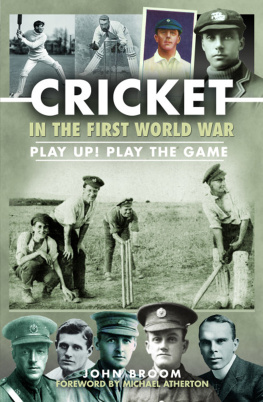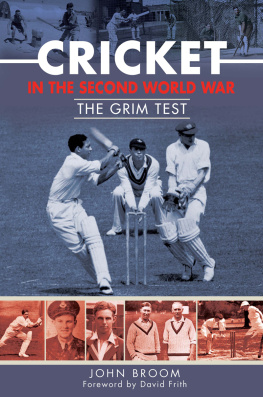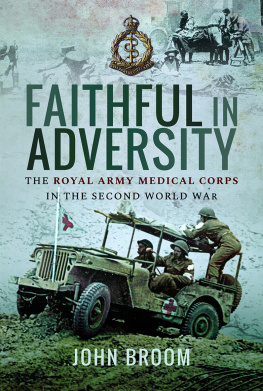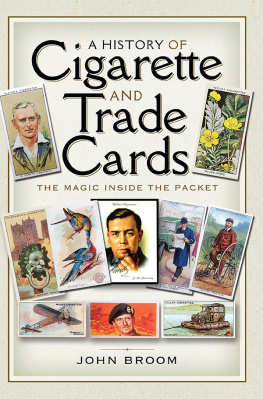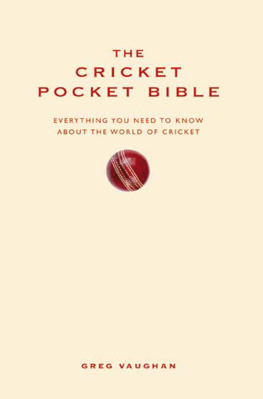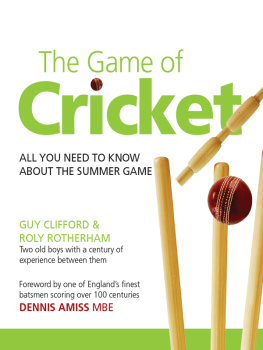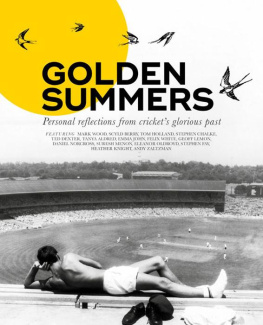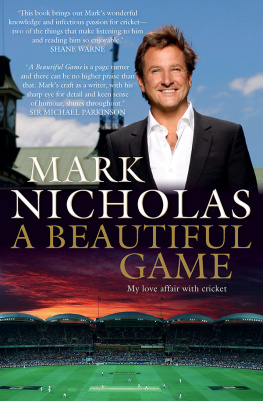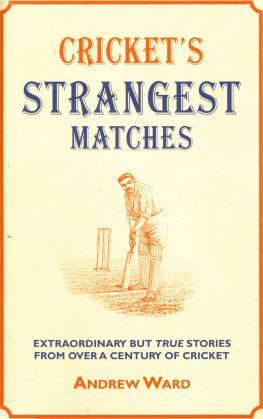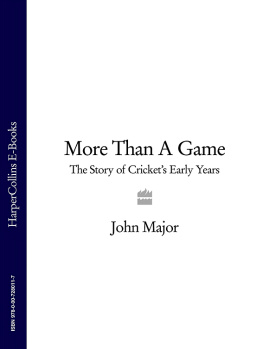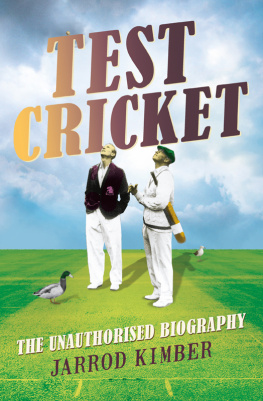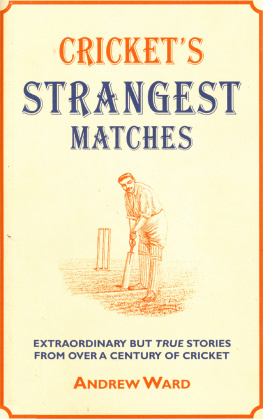Pagebreaks of the print version

Cricket in the
First World War
Other books by John Broom
Cricket in the Second World War: The Grim Test
(Pen & Sword History, 2021)
Reported Missing in the Great War: 100 Years of Searching for the Truth
(Pen & Sword Military, 2020)
Faithful in Adversity: The Royal Army Medical Corps in the Second World War
(Pen & Sword Military, 2019)
Opposition to the Second World War: Conscience, Resistance & Service in Britain 193345
(Pen & Sword Military, 2018)
A History of Cigarette and Trade Cards: The Magic Inside the Packet
(Pen & Sword History, 2018)
Fight the Good Fight: Voices of Faith from the Second World War
(Pen & Sword Military, 2016)
Fight the Good Fight: Voices of Faith from the First World War
(Pen & Sword Military, 2015)
Cricket in the First World War
Play up! Play the Game
John Broom
First published in Great Britain in 2022 by
Pen & Sword History
An imprint of
Pen & Sword Books Ltd
Yorkshire Philadelphia
Copyright John Broom 2022
ISBN 978 1 52678 013 3
eISBN 978 1 52678 014 0
mobi ISBN 978 1 52678 014 0
The right of John Broom to be identified as Author of this work has been asserted by him in accordance with the Copyright, Designs and Patents Act 1988.
A CIP catalogue record for this book is available from the British Library.
All rights reserved. No part of this book may be reproduced or transmitted in any form or by any means, electronic or mechanical including photocopying, recording or by any information storage and retrieval system, without permission from the Publisher in writing.
Pen & Sword Books Limited incorporates the imprints of Atlas, Archaeology, Aviation, Discovery, Family History, Fiction, History, Maritime, Military, Military Classics, Politics, Select, Transport, True Crime, Air World, Frontline Publishing, Leo Cooper, Remember When, Seaforth Publishing, The Praetorian Press, Wharncliffe Local History, Wharncliffe Transport, Wharncliffe True Crime and White Owl.
For a complete list of Pen & Sword titles please contact
PEN & SWORD BOOKS LIMITED
47 Church Street, Barnsley, South Yorkshire, S70 2AS, England
E-mail:
Website: www.pen-and-sword.co.uk
Or
PEN AND SWORD BOOKS
1950 Lawrence Rd, Havertown, PA 19083, USA
E-mail:
Website: www.penandswordbooks.com
To my late parents. I grow ever more grateful by the day for the love of the game of cricket they instilled in me.
To Dawn, for living in a cricket library.
To Rosa, Sophia and David, who I hope play the game through life.
Acknowledgements
S everal people have been generous with their knowledge and expertise during my research for this book. Gordon Anderson, Martin Chandler, Andy Collier, Steve Cooper of the F.W. Harvey Society, Allan Draycott, Rob Franks, David Frith, Dr Andrew Hignell, Steve Jinman, Tim Jones, Steve LeMotte, Jeremy Lonsdale, Malcolm Lorimer, Stephen Musk, Mick Pope, Andrew Radd, Brian Sanderson, K. Martin Tebay, Tony Wainwright BEM, Kathryn White, Martin Williamson.
Also to my editor Linne Matthews and the staff at Pen & Sword books for their assiduousness in assuring the timely presentation and appearance of this book.
Every reasonable effort has been made to seek copyright permissions for the images included and acknowledgements have been made where these have been known. Should I have inadvertently overlooked any copyright holders I should be happy to correct this omission in any future editions of the book.
Foreword
by Mike Atherton
T hose of us born in the late 1960s have been largely blessed. While the country has found itself embroiled in military engagements from time to time, during our prime years there has been nothing on the scale of the world wars of the early twentieth century. War has been something most of us have read about in classrooms, learnt about on newsreel, or watched on film. The vast majority of us have been left untouched.
Maybe that is why we remain fascinated by that period of the early twentieth century that saw a generation of young men swept away in two barbaric wars. In part, this fascination may be based on our own unease: how, we wonder, would we fare if the ultimate question was asked? Would we answer the call of duty and dig deeply, in the most hellish circumstances, to find the bravery required? We are a generation largely untested.
As a history graduate and former cricketer, these two interests have combined from time to time in my current job as a journalist. For the centenary of the First World War, I researched the story of the Yorkshire and England cricketer Major (name not rank) Booth who was injured going over the top at the Somme and who subsequently died in a shell hole in the arms of another Yorkshire and England cricketer, Abe Waddington.
The story was incredibly moving; the piece was widely read and had an interesting postscript. Why, a relative of Booths wanted to know, was he not commemorated at Lords along with all the other fallen cricketers who had represented MCC and who were remembered on the rolls of honour there? There are 612 names on those rolls of honour at Lords, but Booths name was not among them.
The answer was that Booth was a professional cricketer, not an amateur, and because of that, even though he had represented MCC (the only reason they could identify his remains on the battlefield was because of the MCC cigarette case from the South Africa tour) he could not be a member of the club, and therefore had not been commemorated. His name was missing.
We found a dozen others in that odd situation of having represented MCC but because of their professional status were not members, and four years after the original piece was written, a profoundly moving dinner was held at Lords to honour them. I sat next to the late Field Marshal the Lord Bramall, one of the most decorated soldiers of our time, and he commemorated the men. Their names are remembered now in an engraved casing on the landing of the southern staircase of the Lords Pavilion, the great left-arm spinner, Colin Blythe among them.
One of these cricketers was called Private Percy Hardy, a Somerset professional of far more modest ability than Blythe, who killed himself at Kings Cross Station so that he did not have to return to the Western Front. His story is told in this book, one of the many tales of indescribable sadness. Having endured dysentery and frostbite in Turkey and having survived Verdun, he could not face going back to war. He wanted peace, and the bloodied knife found by his side in the railway station was the tragic means by which he found it.
Hardy was one of 289 first-class cricketers who fell in the First World War. This book tells the story of this cohort of men who made the ultimate sacrifice and of a game that found a way to survive and prosper in the most challenging circumstances, as it always has. Remembering is the best way to repay the debt we owe.
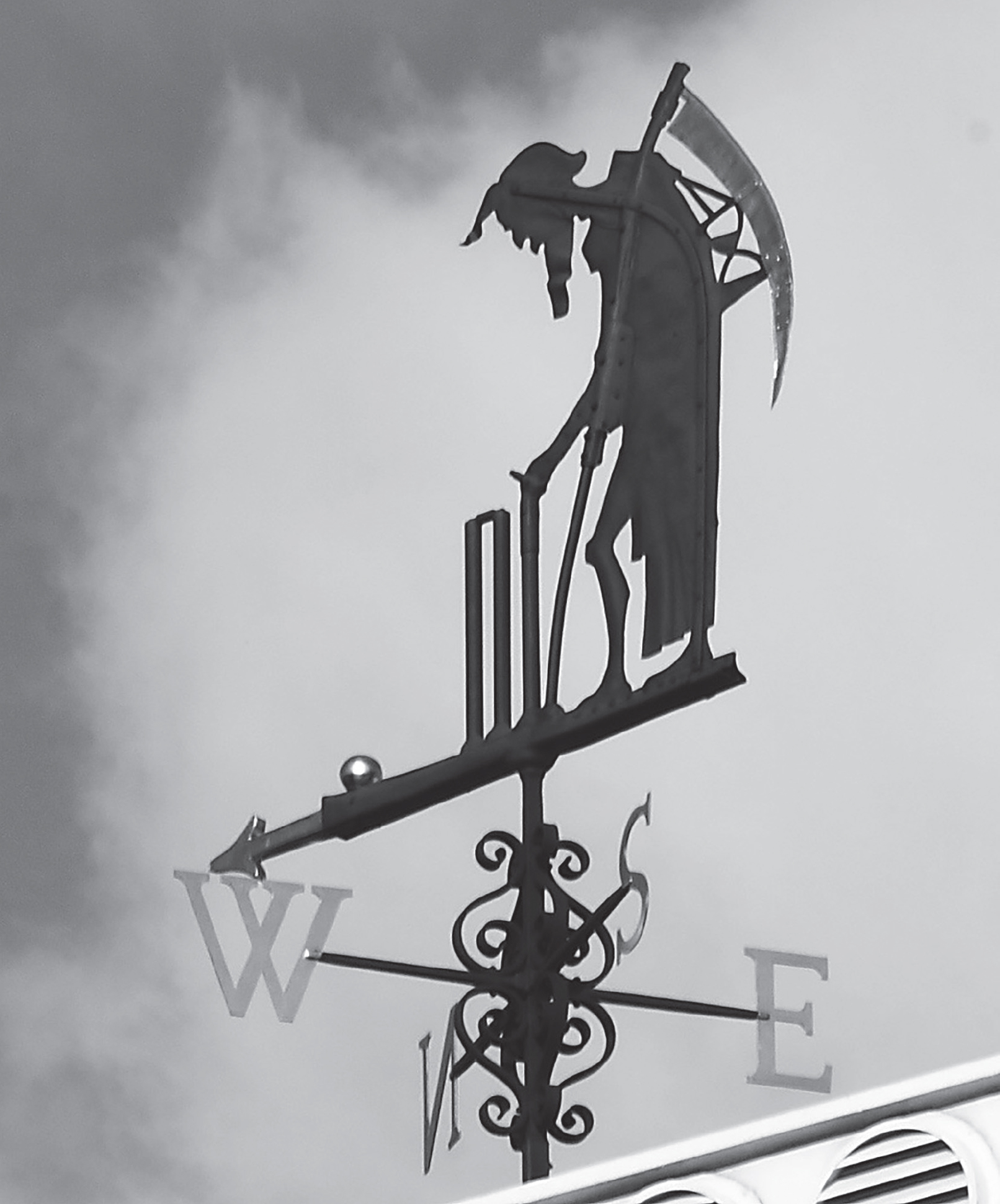
The Old Father Time weather vane has presided over events at Lords Cricket Ground since 1926. The rather melancholy figure was donated by Sir Herbert Baker at the time he designed the grounds grandstand. Baker, who designed several notable war memorials across the globe, including those at Loos, Delville Wood, Tyne Cot and Winchester College, perhaps had in mind the sorrow of war, and the passing of time which would never erase memories of the lost.

